Unit 187: Operations and Project Management: Unilever Case Study
VerifiedAdded on 2023/06/07
|15
|4535
|145
Report
AI Summary
This report provides a comprehensive review and critique of Unilever's operations management. It begins with an introduction to Unilever, followed by a distinction between operation and operations management. The report then analyzes the implementation of operations management principles within Unilever, evaluating how well the organization meets its requirements. It discusses continuous improvement as a philosophy, describing Lean principles and Six Sigma, and proposes a continuous improvement plan with justified recommendations based on the review. The analysis covers key aspects such as product quality, cost-effectiveness, efficiency, and adaptability to market trends, emphasizing the importance of customer satisfaction and organizational growth. The report concludes by highlighting the significance of continuous improvement plans in resolving quality issues and achieving organizational goals, supported by strategic planning and employee training.
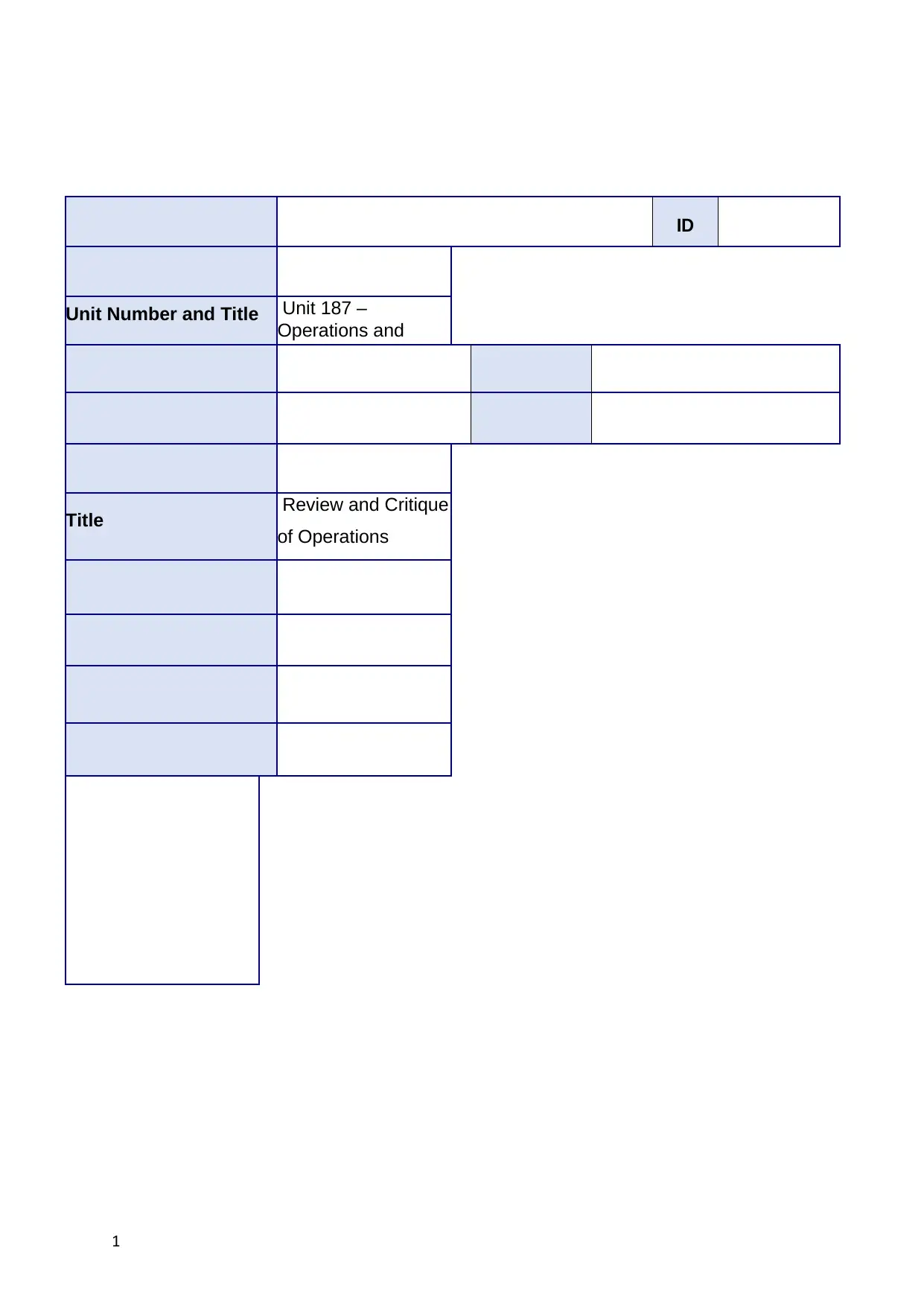
ID
Unit Number and Title Unit 187 –
Operations and
Project Management
Title Review and Critique
of Operations
Management (Part
1
Unit Number and Title Unit 187 –
Operations and
Project Management
Title Review and Critique
of Operations
Management (Part
1
Paraphrase This Document
Need a fresh take? Get an instant paraphrase of this document with our AI Paraphraser
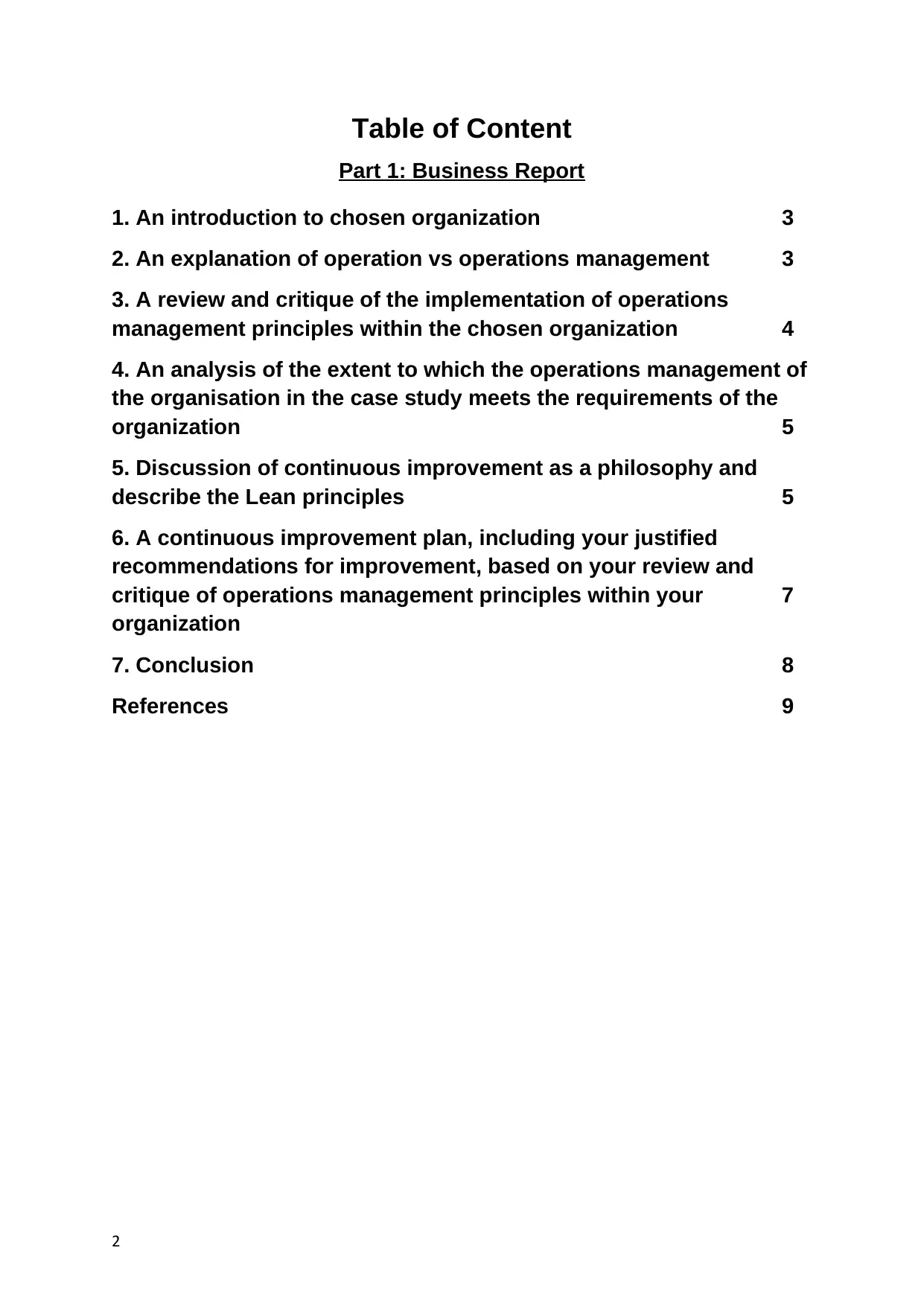
Table of Content
Part 1: Business Report
1. An introduction to chosen organization 3
2. An explanation of operation vs operations management 3
3. A review and critique of the implementation of operations
management principles within the chosen organization 4
4. An analysis of the extent to which the operations management of
the organisation in the case study meets the requirements of the
organization 5
5. Discussion of continuous improvement as a philosophy and
describe the Lean principles 5
6. A continuous improvement plan, including your justified
recommendations for improvement, based on your review and
critique of operations management principles within your 7
organization
7. Conclusion 8
References 9
2
Part 1: Business Report
1. An introduction to chosen organization 3
2. An explanation of operation vs operations management 3
3. A review and critique of the implementation of operations
management principles within the chosen organization 4
4. An analysis of the extent to which the operations management of
the organisation in the case study meets the requirements of the
organization 5
5. Discussion of continuous improvement as a philosophy and
describe the Lean principles 5
6. A continuous improvement plan, including your justified
recommendations for improvement, based on your review and
critique of operations management principles within your 7
organization
7. Conclusion 8
References 9
2
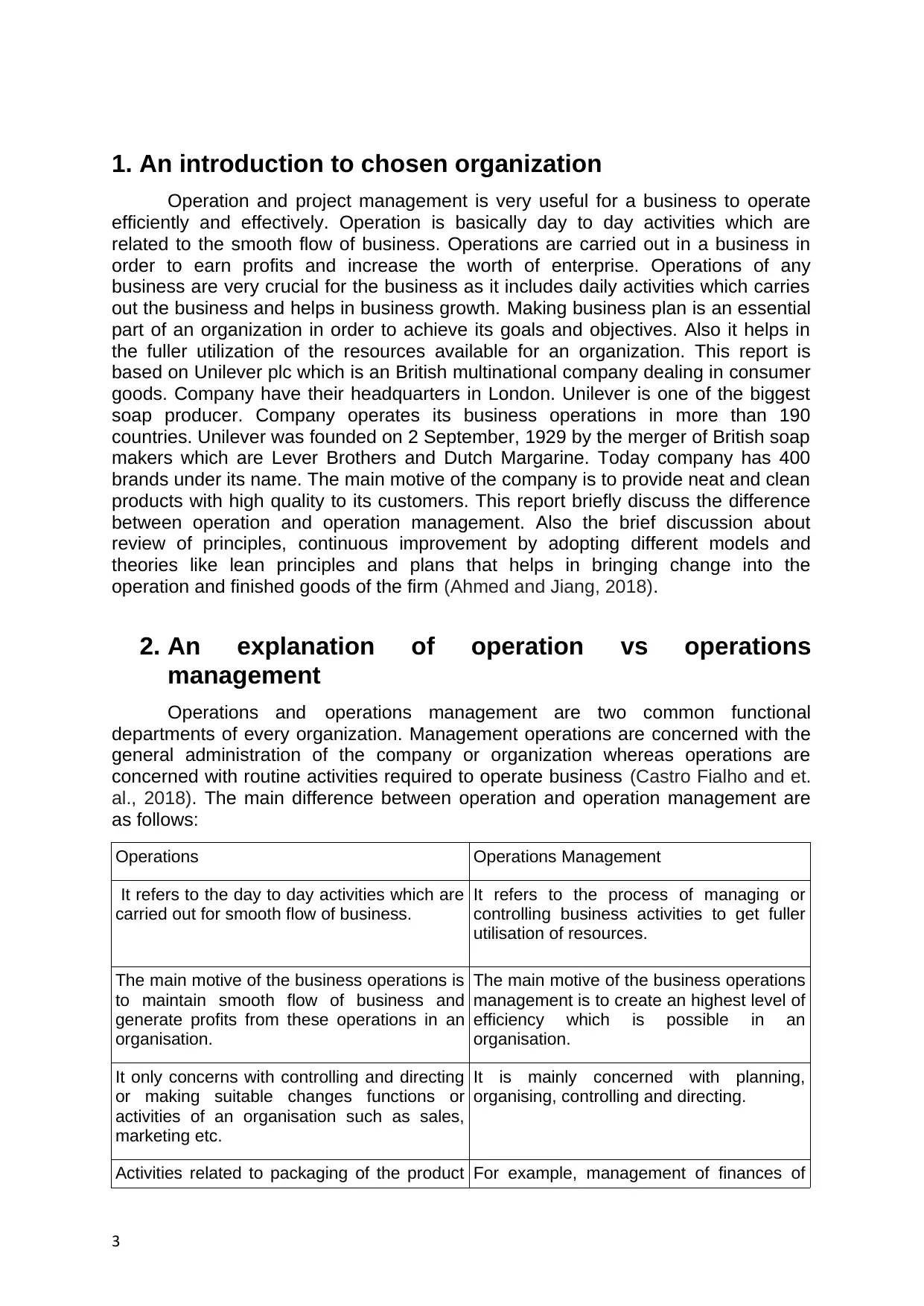
1. An introduction to chosen organization
Operation and project management is very useful for a business to operate
efficiently and effectively. Operation is basically day to day activities which are
related to the smooth flow of business. Operations are carried out in a business in
order to earn profits and increase the worth of enterprise. Operations of any
business are very crucial for the business as it includes daily activities which carries
out the business and helps in business growth. Making business plan is an essential
part of an organization in order to achieve its goals and objectives. Also it helps in
the fuller utilization of the resources available for an organization. This report is
based on Unilever plc which is an British multinational company dealing in consumer
goods. Company have their headquarters in London. Unilever is one of the biggest
soap producer. Company operates its business operations in more than 190
countries. Unilever was founded on 2 September, 1929 by the merger of British soap
makers which are Lever Brothers and Dutch Margarine. Today company has 400
brands under its name. The main motive of the company is to provide neat and clean
products with high quality to its customers. This report briefly discuss the difference
between operation and operation management. Also the brief discussion about
review of principles, continuous improvement by adopting different models and
theories like lean principles and plans that helps in bringing change into the
operation and finished goods of the firm (Ahmed and Jiang, 2018).
2. An explanation of operation vs operations
management
Operations and operations management are two common functional
departments of every organization. Management operations are concerned with the
general administration of the company or organization whereas operations are
concerned with routine activities required to operate business (Castro Fialho and et.
al., 2018). The main difference between operation and operation management are
as follows:
Operations Operations Management
It refers to the day to day activities which are
carried out for smooth flow of business.
It refers to the process of managing or
controlling business activities to get fuller
utilisation of resources.
The main motive of the business operations is
to maintain smooth flow of business and
generate profits from these operations in an
organisation.
The main motive of the business operations
management is to create an highest level of
efficiency which is possible in an
organisation.
It only concerns with controlling and directing
or making suitable changes functions or
activities of an organisation such as sales,
marketing etc.
It is mainly concerned with planning,
organising, controlling and directing.
Activities related to packaging of the product For example, management of finances of
3
Operation and project management is very useful for a business to operate
efficiently and effectively. Operation is basically day to day activities which are
related to the smooth flow of business. Operations are carried out in a business in
order to earn profits and increase the worth of enterprise. Operations of any
business are very crucial for the business as it includes daily activities which carries
out the business and helps in business growth. Making business plan is an essential
part of an organization in order to achieve its goals and objectives. Also it helps in
the fuller utilization of the resources available for an organization. This report is
based on Unilever plc which is an British multinational company dealing in consumer
goods. Company have their headquarters in London. Unilever is one of the biggest
soap producer. Company operates its business operations in more than 190
countries. Unilever was founded on 2 September, 1929 by the merger of British soap
makers which are Lever Brothers and Dutch Margarine. Today company has 400
brands under its name. The main motive of the company is to provide neat and clean
products with high quality to its customers. This report briefly discuss the difference
between operation and operation management. Also the brief discussion about
review of principles, continuous improvement by adopting different models and
theories like lean principles and plans that helps in bringing change into the
operation and finished goods of the firm (Ahmed and Jiang, 2018).
2. An explanation of operation vs operations
management
Operations and operations management are two common functional
departments of every organization. Management operations are concerned with the
general administration of the company or organization whereas operations are
concerned with routine activities required to operate business (Castro Fialho and et.
al., 2018). The main difference between operation and operation management are
as follows:
Operations Operations Management
It refers to the day to day activities which are
carried out for smooth flow of business.
It refers to the process of managing or
controlling business activities to get fuller
utilisation of resources.
The main motive of the business operations is
to maintain smooth flow of business and
generate profits from these operations in an
organisation.
The main motive of the business operations
management is to create an highest level of
efficiency which is possible in an
organisation.
It only concerns with controlling and directing
or making suitable changes functions or
activities of an organisation such as sales,
marketing etc.
It is mainly concerned with planning,
organising, controlling and directing.
Activities related to packaging of the product For example, management of finances of
3
⊘ This is a preview!⊘
Do you want full access?
Subscribe today to unlock all pages.

Trusted by 1+ million students worldwide
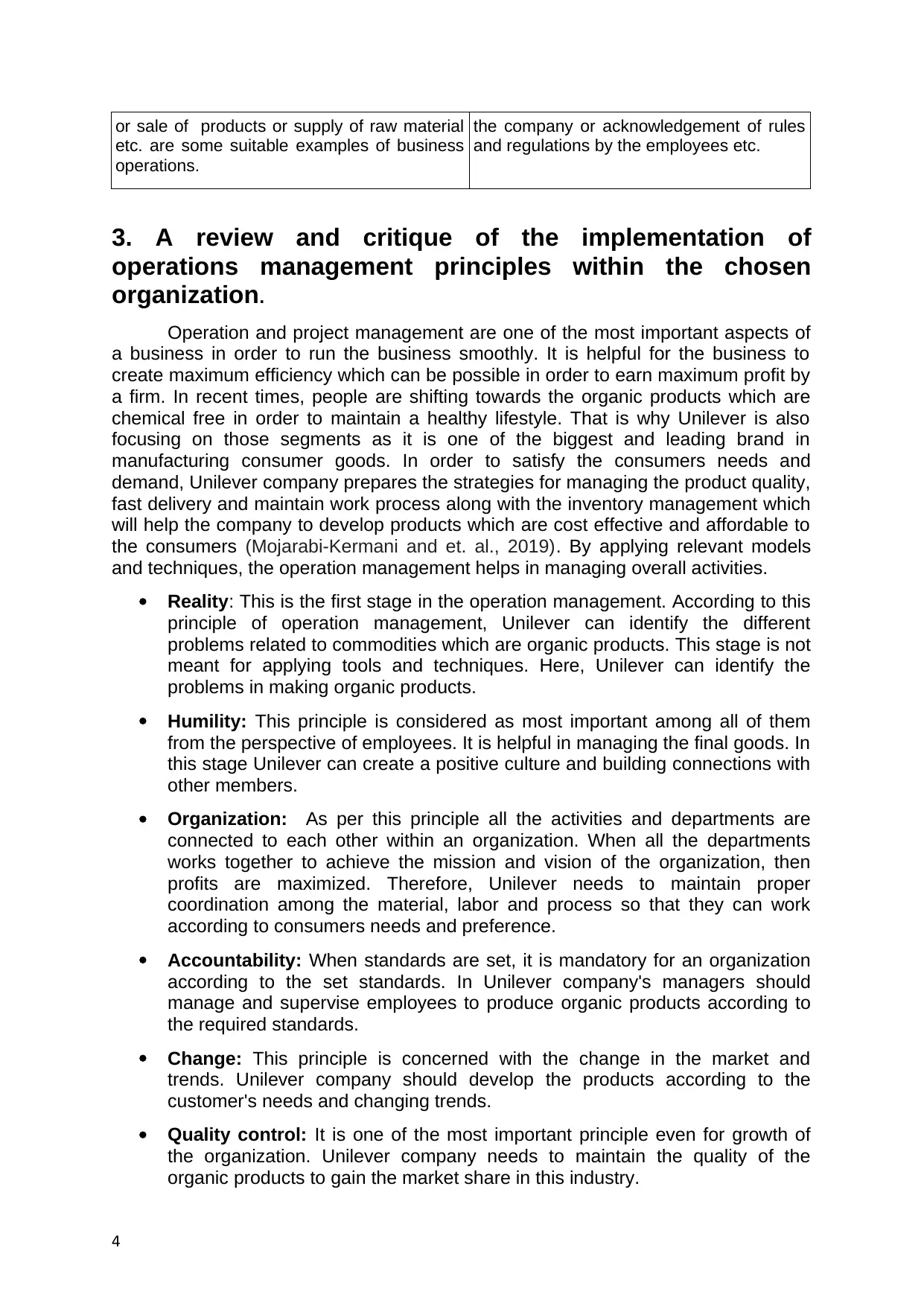
or sale of products or supply of raw material
etc. are some suitable examples of business
operations.
the company or acknowledgement of rules
and regulations by the employees etc.
3. A review and critique of the implementation of
operations management principles within the chosen
organization.
Operation and project management are one of the most important aspects of
a business in order to run the business smoothly. It is helpful for the business to
create maximum efficiency which can be possible in order to earn maximum profit by
a firm. In recent times, people are shifting towards the organic products which are
chemical free in order to maintain a healthy lifestyle. That is why Unilever is also
focusing on those segments as it is one of the biggest and leading brand in
manufacturing consumer goods. In order to satisfy the consumers needs and
demand, Unilever company prepares the strategies for managing the product quality,
fast delivery and maintain work process along with the inventory management which
will help the company to develop products which are cost effective and affordable to
the consumers (Mojarabi-Kermani and et. al., 2019). By applying relevant models
and techniques, the operation management helps in managing overall activities.
Reality: This is the first stage in the operation management. According to this
principle of operation management, Unilever can identify the different
problems related to commodities which are organic products. This stage is not
meant for applying tools and techniques. Here, Unilever can identify the
problems in making organic products.
Humility: This principle is considered as most important among all of them
from the perspective of employees. It is helpful in managing the final goods. In
this stage Unilever can create a positive culture and building connections with
other members.
Organization: As per this principle all the activities and departments are
connected to each other within an organization. When all the departments
works together to achieve the mission and vision of the organization, then
profits are maximized. Therefore, Unilever needs to maintain proper
coordination among the material, labor and process so that they can work
according to consumers needs and preference.
Accountability: When standards are set, it is mandatory for an organization
according to the set standards. In Unilever company's managers should
manage and supervise employees to produce organic products according to
the required standards.
Change: This principle is concerned with the change in the market and
trends. Unilever company should develop the products according to the
customer's needs and changing trends.
Quality control: It is one of the most important principle even for growth of
the organization. Unilever company needs to maintain the quality of the
organic products to gain the market share in this industry.
4
etc. are some suitable examples of business
operations.
the company or acknowledgement of rules
and regulations by the employees etc.
3. A review and critique of the implementation of
operations management principles within the chosen
organization.
Operation and project management are one of the most important aspects of
a business in order to run the business smoothly. It is helpful for the business to
create maximum efficiency which can be possible in order to earn maximum profit by
a firm. In recent times, people are shifting towards the organic products which are
chemical free in order to maintain a healthy lifestyle. That is why Unilever is also
focusing on those segments as it is one of the biggest and leading brand in
manufacturing consumer goods. In order to satisfy the consumers needs and
demand, Unilever company prepares the strategies for managing the product quality,
fast delivery and maintain work process along with the inventory management which
will help the company to develop products which are cost effective and affordable to
the consumers (Mojarabi-Kermani and et. al., 2019). By applying relevant models
and techniques, the operation management helps in managing overall activities.
Reality: This is the first stage in the operation management. According to this
principle of operation management, Unilever can identify the different
problems related to commodities which are organic products. This stage is not
meant for applying tools and techniques. Here, Unilever can identify the
problems in making organic products.
Humility: This principle is considered as most important among all of them
from the perspective of employees. It is helpful in managing the final goods. In
this stage Unilever can create a positive culture and building connections with
other members.
Organization: As per this principle all the activities and departments are
connected to each other within an organization. When all the departments
works together to achieve the mission and vision of the organization, then
profits are maximized. Therefore, Unilever needs to maintain proper
coordination among the material, labor and process so that they can work
according to consumers needs and preference.
Accountability: When standards are set, it is mandatory for an organization
according to the set standards. In Unilever company's managers should
manage and supervise employees to produce organic products according to
the required standards.
Change: This principle is concerned with the change in the market and
trends. Unilever company should develop the products according to the
customer's needs and changing trends.
Quality control: It is one of the most important principle even for growth of
the organization. Unilever company needs to maintain the quality of the
organic products to gain the market share in this industry.
4
Paraphrase This Document
Need a fresh take? Get an instant paraphrase of this document with our AI Paraphraser
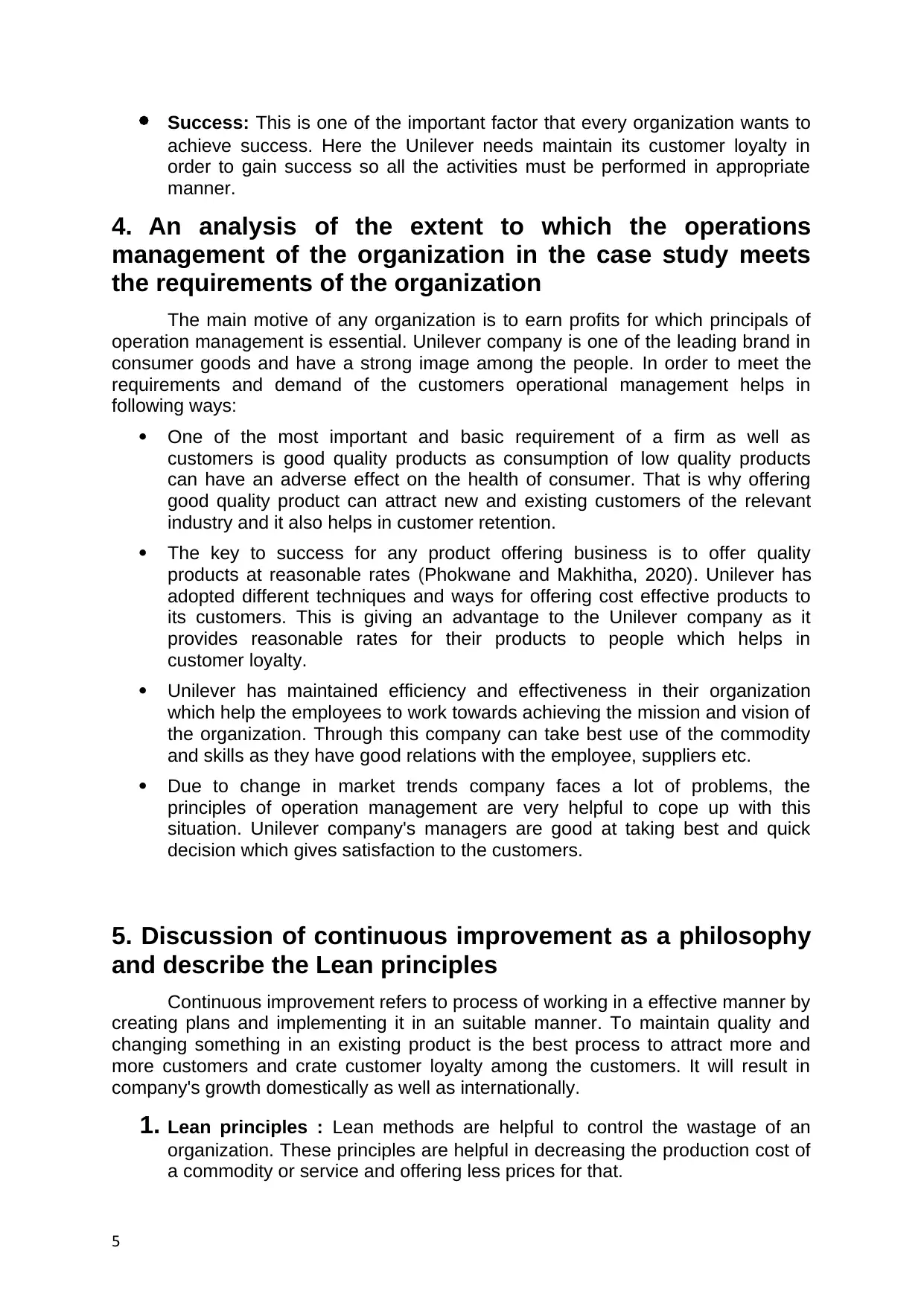
Success: This is one of the important factor that every organization wants to
achieve success. Here the Unilever needs maintain its customer loyalty in
order to gain success so all the activities must be performed in appropriate
manner.
4. An analysis of the extent to which the operations
management of the organization in the case study meets
the requirements of the organization
The main motive of any organization is to earn profits for which principals of
operation management is essential. Unilever company is one of the leading brand in
consumer goods and have a strong image among the people. In order to meet the
requirements and demand of the customers operational management helps in
following ways:
One of the most important and basic requirement of a firm as well as
customers is good quality products as consumption of low quality products
can have an adverse effect on the health of consumer. That is why offering
good quality product can attract new and existing customers of the relevant
industry and it also helps in customer retention.
The key to success for any product offering business is to offer quality
products at reasonable rates (Phokwane and Makhitha, 2020). Unilever has
adopted different techniques and ways for offering cost effective products to
its customers. This is giving an advantage to the Unilever company as it
provides reasonable rates for their products to people which helps in
customer loyalty.
Unilever has maintained efficiency and effectiveness in their organization
which help the employees to work towards achieving the mission and vision of
the organization. Through this company can take best use of the commodity
and skills as they have good relations with the employee, suppliers etc.
Due to change in market trends company faces a lot of problems, the
principles of operation management are very helpful to cope up with this
situation. Unilever company's managers are good at taking best and quick
decision which gives satisfaction to the customers.
5. Discussion of continuous improvement as a philosophy
and describe the Lean principles
Continuous improvement refers to process of working in a effective manner by
creating plans and implementing it in an suitable manner. To maintain quality and
changing something in an existing product is the best process to attract more and
more customers and crate customer loyalty among the customers. It will result in
company's growth domestically as well as internationally.
1. Lean principles : Lean methods are helpful to control the wastage of an
organization. These principles are helpful in decreasing the production cost of
a commodity or service and offering less prices for that.
5
achieve success. Here the Unilever needs maintain its customer loyalty in
order to gain success so all the activities must be performed in appropriate
manner.
4. An analysis of the extent to which the operations
management of the organization in the case study meets
the requirements of the organization
The main motive of any organization is to earn profits for which principals of
operation management is essential. Unilever company is one of the leading brand in
consumer goods and have a strong image among the people. In order to meet the
requirements and demand of the customers operational management helps in
following ways:
One of the most important and basic requirement of a firm as well as
customers is good quality products as consumption of low quality products
can have an adverse effect on the health of consumer. That is why offering
good quality product can attract new and existing customers of the relevant
industry and it also helps in customer retention.
The key to success for any product offering business is to offer quality
products at reasonable rates (Phokwane and Makhitha, 2020). Unilever has
adopted different techniques and ways for offering cost effective products to
its customers. This is giving an advantage to the Unilever company as it
provides reasonable rates for their products to people which helps in
customer loyalty.
Unilever has maintained efficiency and effectiveness in their organization
which help the employees to work towards achieving the mission and vision of
the organization. Through this company can take best use of the commodity
and skills as they have good relations with the employee, suppliers etc.
Due to change in market trends company faces a lot of problems, the
principles of operation management are very helpful to cope up with this
situation. Unilever company's managers are good at taking best and quick
decision which gives satisfaction to the customers.
5. Discussion of continuous improvement as a philosophy
and describe the Lean principles
Continuous improvement refers to process of working in a effective manner by
creating plans and implementing it in an suitable manner. To maintain quality and
changing something in an existing product is the best process to attract more and
more customers and crate customer loyalty among the customers. It will result in
company's growth domestically as well as internationally.
1. Lean principles : Lean methods are helpful to control the wastage of an
organization. These principles are helpful in decreasing the production cost of
a commodity or service and offering less prices for that.
5
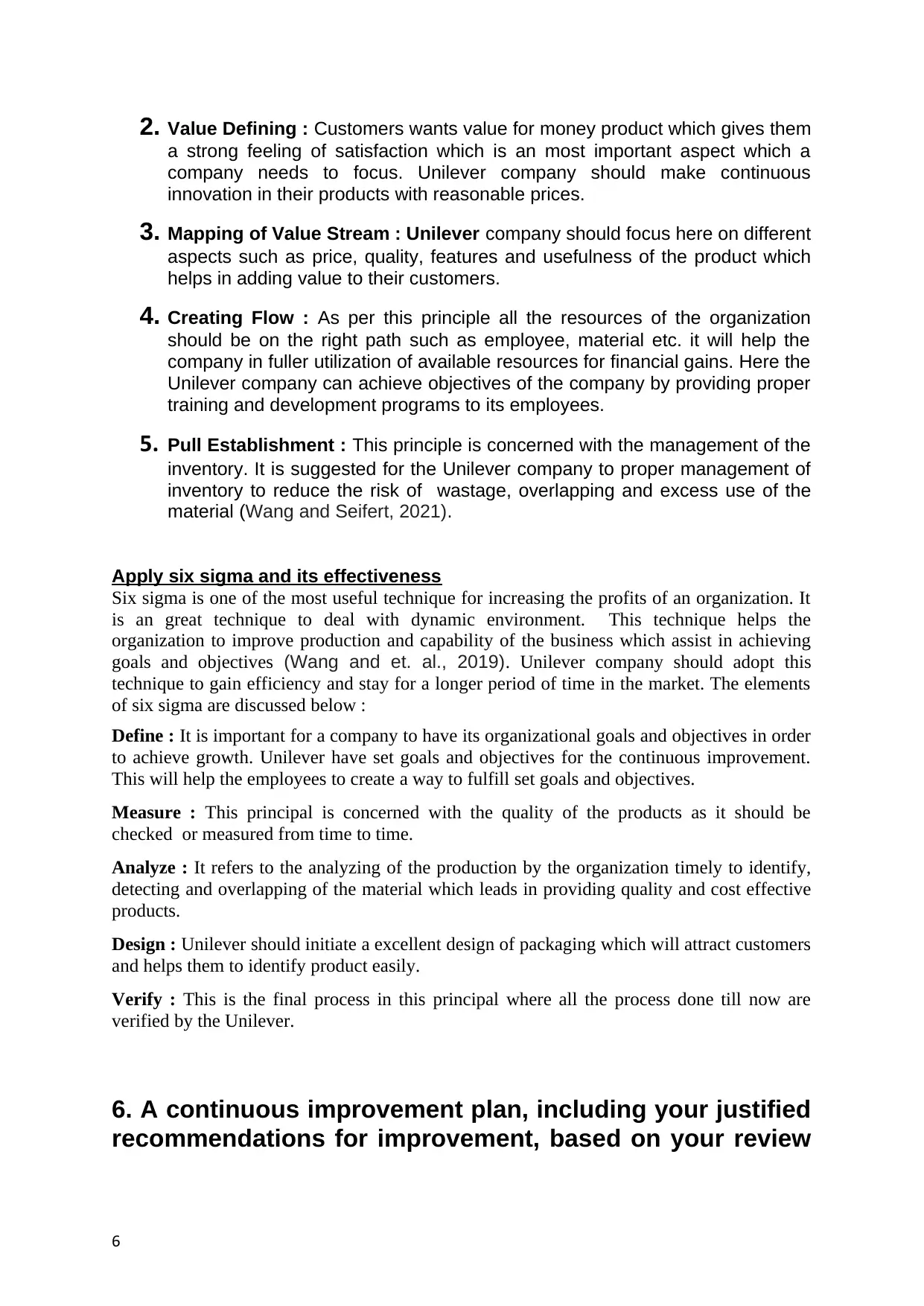
2. Value Defining : Customers wants value for money product which gives them
a strong feeling of satisfaction which is an most important aspect which a
company needs to focus. Unilever company should make continuous
innovation in their products with reasonable prices.
3. Mapping of Value Stream : Unilever company should focus here on different
aspects such as price, quality, features and usefulness of the product which
helps in adding value to their customers.
4. Creating Flow : As per this principle all the resources of the organization
should be on the right path such as employee, material etc. it will help the
company in fuller utilization of available resources for financial gains. Here the
Unilever company can achieve objectives of the company by providing proper
training and development programs to its employees.
5. Pull Establishment : This principle is concerned with the management of the
inventory. It is suggested for the Unilever company to proper management of
inventory to reduce the risk of wastage, overlapping and excess use of the
material (Wang and Seifert, 2021).
Apply six sigma and its effectiveness
Six sigma is one of the most useful technique for increasing the profits of an organization. It
is an great technique to deal with dynamic environment. This technique helps the
organization to improve production and capability of the business which assist in achieving
goals and objectives (Wang and et. al., 2019). Unilever company should adopt this
technique to gain efficiency and stay for a longer period of time in the market. The elements
of six sigma are discussed below :
Define : It is important for a company to have its organizational goals and objectives in order
to achieve growth. Unilever have set goals and objectives for the continuous improvement.
This will help the employees to create a way to fulfill set goals and objectives.
Measure : This principal is concerned with the quality of the products as it should be
checked or measured from time to time.
Analyze : It refers to the analyzing of the production by the organization timely to identify,
detecting and overlapping of the material which leads in providing quality and cost effective
products.
Design : Unilever should initiate a excellent design of packaging which will attract customers
and helps them to identify product easily.
Verify : This is the final process in this principal where all the process done till now are
verified by the Unilever.
6. A continuous improvement plan, including your justified
recommendations for improvement, based on your review
6
a strong feeling of satisfaction which is an most important aspect which a
company needs to focus. Unilever company should make continuous
innovation in their products with reasonable prices.
3. Mapping of Value Stream : Unilever company should focus here on different
aspects such as price, quality, features and usefulness of the product which
helps in adding value to their customers.
4. Creating Flow : As per this principle all the resources of the organization
should be on the right path such as employee, material etc. it will help the
company in fuller utilization of available resources for financial gains. Here the
Unilever company can achieve objectives of the company by providing proper
training and development programs to its employees.
5. Pull Establishment : This principle is concerned with the management of the
inventory. It is suggested for the Unilever company to proper management of
inventory to reduce the risk of wastage, overlapping and excess use of the
material (Wang and Seifert, 2021).
Apply six sigma and its effectiveness
Six sigma is one of the most useful technique for increasing the profits of an organization. It
is an great technique to deal with dynamic environment. This technique helps the
organization to improve production and capability of the business which assist in achieving
goals and objectives (Wang and et. al., 2019). Unilever company should adopt this
technique to gain efficiency and stay for a longer period of time in the market. The elements
of six sigma are discussed below :
Define : It is important for a company to have its organizational goals and objectives in order
to achieve growth. Unilever have set goals and objectives for the continuous improvement.
This will help the employees to create a way to fulfill set goals and objectives.
Measure : This principal is concerned with the quality of the products as it should be
checked or measured from time to time.
Analyze : It refers to the analyzing of the production by the organization timely to identify,
detecting and overlapping of the material which leads in providing quality and cost effective
products.
Design : Unilever should initiate a excellent design of packaging which will attract customers
and helps them to identify product easily.
Verify : This is the final process in this principal where all the process done till now are
verified by the Unilever.
6. A continuous improvement plan, including your justified
recommendations for improvement, based on your review
6
⊘ This is a preview!⊘
Do you want full access?
Subscribe today to unlock all pages.

Trusted by 1+ million students worldwide
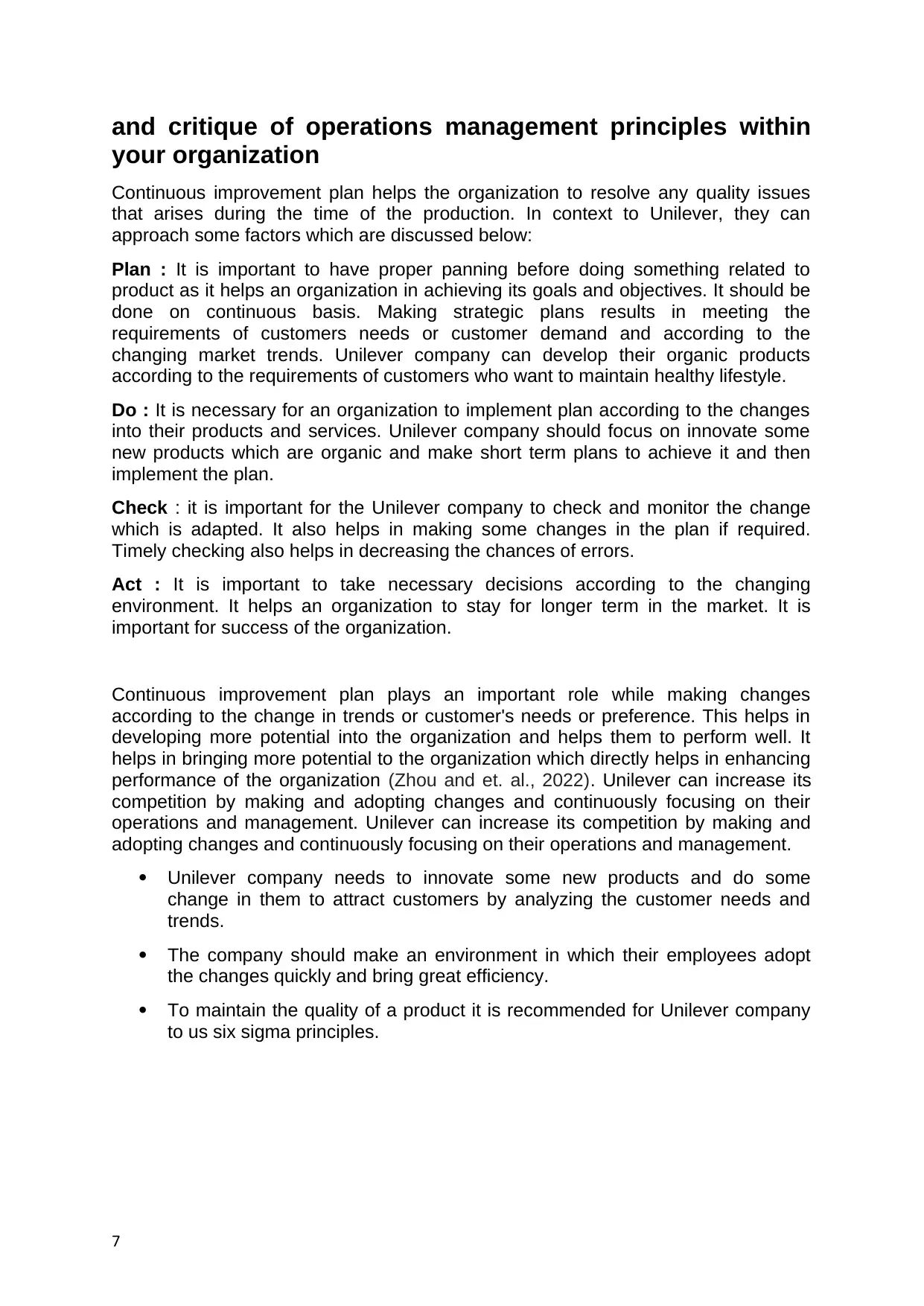
and critique of operations management principles within
your organization
Continuous improvement plan helps the organization to resolve any quality issues
that arises during the time of the production. In context to Unilever, they can
approach some factors which are discussed below:
Plan : It is important to have proper panning before doing something related to
product as it helps an organization in achieving its goals and objectives. It should be
done on continuous basis. Making strategic plans results in meeting the
requirements of customers needs or customer demand and according to the
changing market trends. Unilever company can develop their organic products
according to the requirements of customers who want to maintain healthy lifestyle.
Do : It is necessary for an organization to implement plan according to the changes
into their products and services. Unilever company should focus on innovate some
new products which are organic and make short term plans to achieve it and then
implement the plan.
Check : it is important for the Unilever company to check and monitor the change
which is adapted. It also helps in making some changes in the plan if required.
Timely checking also helps in decreasing the chances of errors.
Act : It is important to take necessary decisions according to the changing
environment. It helps an organization to stay for longer term in the market. It is
important for success of the organization.
Continuous improvement plan plays an important role while making changes
according to the change in trends or customer's needs or preference. This helps in
developing more potential into the organization and helps them to perform well. It
helps in bringing more potential to the organization which directly helps in enhancing
performance of the organization (Zhou and et. al., 2022). Unilever can increase its
competition by making and adopting changes and continuously focusing on their
operations and management. Unilever can increase its competition by making and
adopting changes and continuously focusing on their operations and management.
Unilever company needs to innovate some new products and do some
change in them to attract customers by analyzing the customer needs and
trends.
The company should make an environment in which their employees adopt
the changes quickly and bring great efficiency.
To maintain the quality of a product it is recommended for Unilever company
to us six sigma principles.
7
your organization
Continuous improvement plan helps the organization to resolve any quality issues
that arises during the time of the production. In context to Unilever, they can
approach some factors which are discussed below:
Plan : It is important to have proper panning before doing something related to
product as it helps an organization in achieving its goals and objectives. It should be
done on continuous basis. Making strategic plans results in meeting the
requirements of customers needs or customer demand and according to the
changing market trends. Unilever company can develop their organic products
according to the requirements of customers who want to maintain healthy lifestyle.
Do : It is necessary for an organization to implement plan according to the changes
into their products and services. Unilever company should focus on innovate some
new products which are organic and make short term plans to achieve it and then
implement the plan.
Check : it is important for the Unilever company to check and monitor the change
which is adapted. It also helps in making some changes in the plan if required.
Timely checking also helps in decreasing the chances of errors.
Act : It is important to take necessary decisions according to the changing
environment. It helps an organization to stay for longer term in the market. It is
important for success of the organization.
Continuous improvement plan plays an important role while making changes
according to the change in trends or customer's needs or preference. This helps in
developing more potential into the organization and helps them to perform well. It
helps in bringing more potential to the organization which directly helps in enhancing
performance of the organization (Zhou and et. al., 2022). Unilever can increase its
competition by making and adopting changes and continuously focusing on their
operations and management. Unilever can increase its competition by making and
adopting changes and continuously focusing on their operations and management.
Unilever company needs to innovate some new products and do some
change in them to attract customers by analyzing the customer needs and
trends.
The company should make an environment in which their employees adopt
the changes quickly and bring great efficiency.
To maintain the quality of a product it is recommended for Unilever company
to us six sigma principles.
7
Paraphrase This Document
Need a fresh take? Get an instant paraphrase of this document with our AI Paraphraser
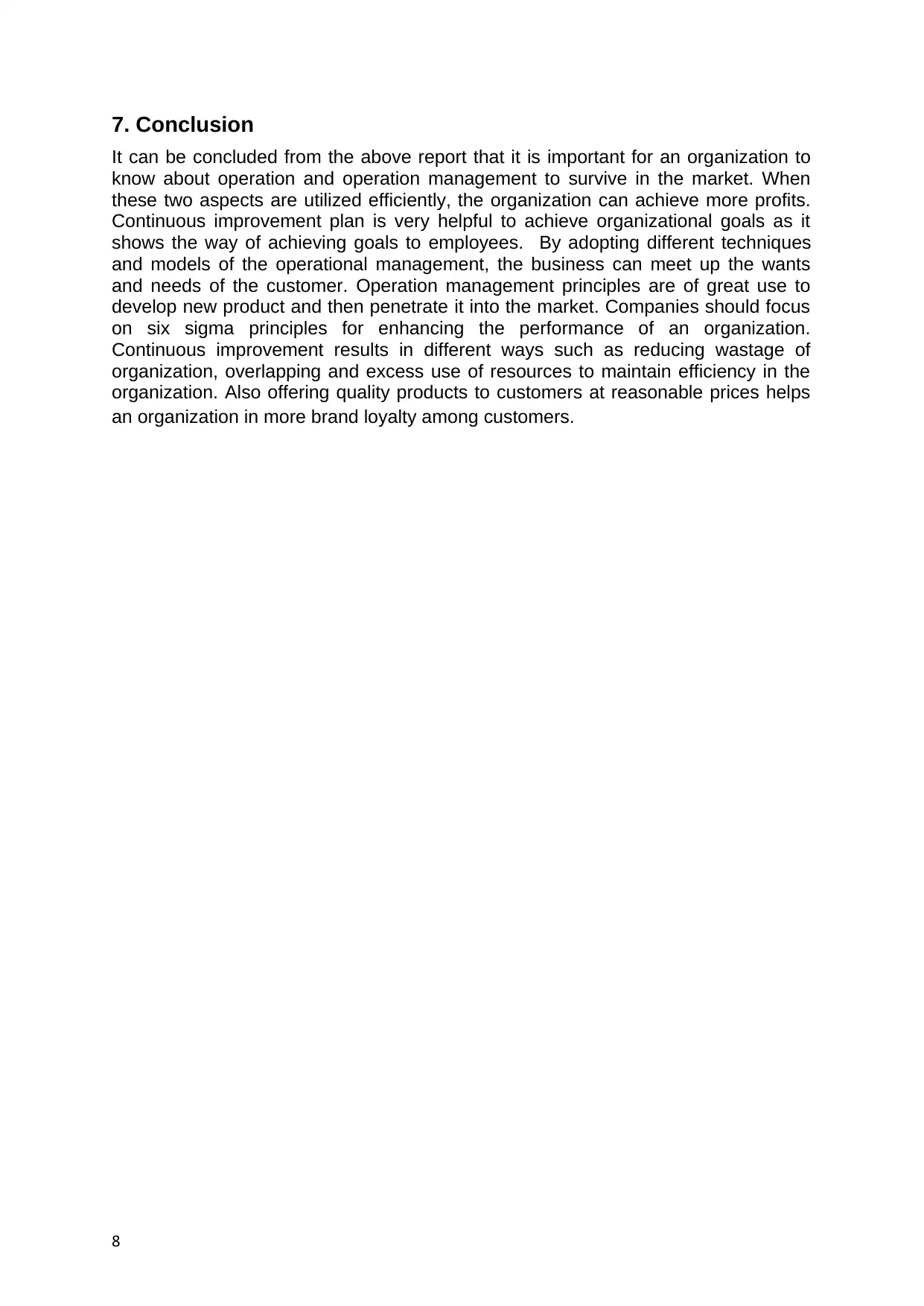
7. Conclusion
It can be concluded from the above report that it is important for an organization to
know about operation and operation management to survive in the market. When
these two aspects are utilized efficiently, the organization can achieve more profits.
Continuous improvement plan is very helpful to achieve organizational goals as it
shows the way of achieving goals to employees. By adopting different techniques
and models of the operational management, the business can meet up the wants
and needs of the customer. Operation management principles are of great use to
develop new product and then penetrate it into the market. Companies should focus
on six sigma principles for enhancing the performance of an organization.
Continuous improvement results in different ways such as reducing wastage of
organization, overlapping and excess use of resources to maintain efficiency in the
organization. Also offering quality products to customers at reasonable prices helps
an organization in more brand loyalty among customers.
8
It can be concluded from the above report that it is important for an organization to
know about operation and operation management to survive in the market. When
these two aspects are utilized efficiently, the organization can achieve more profits.
Continuous improvement plan is very helpful to achieve organizational goals as it
shows the way of achieving goals to employees. By adopting different techniques
and models of the operational management, the business can meet up the wants
and needs of the customer. Operation management principles are of great use to
develop new product and then penetrate it into the market. Companies should focus
on six sigma principles for enhancing the performance of an organization.
Continuous improvement results in different ways such as reducing wastage of
organization, overlapping and excess use of resources to maintain efficiency in the
organization. Also offering quality products to customers at reasonable prices helps
an organization in more brand loyalty among customers.
8
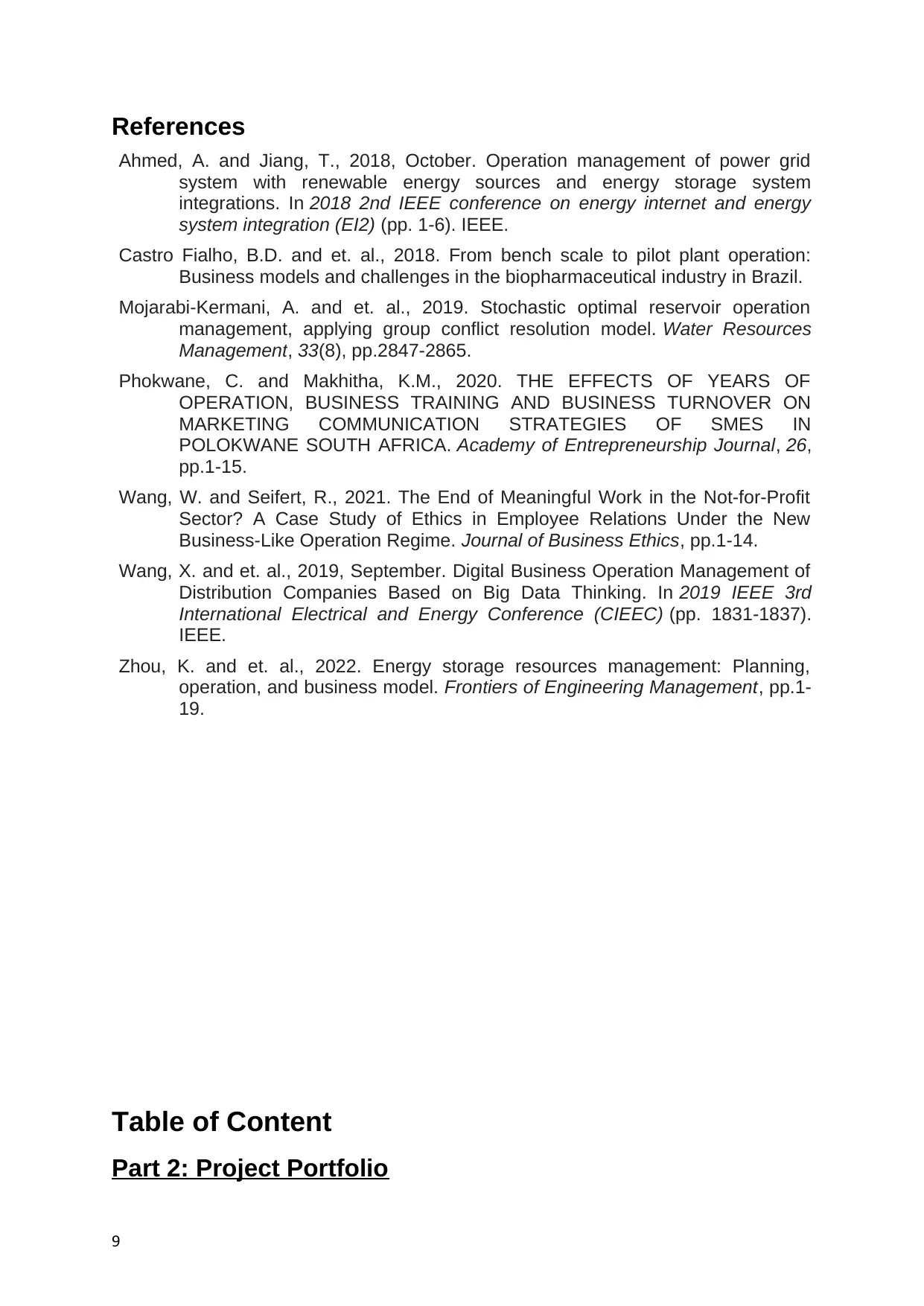
References
Ahmed, A. and Jiang, T., 2018, October. Operation management of power grid
system with renewable energy sources and energy storage system
integrations. In 2018 2nd IEEE conference on energy internet and energy
system integration (EI2) (pp. 1-6). IEEE.
Castro Fialho, B.D. and et. al., 2018. From bench scale to pilot plant operation:
Business models and challenges in the biopharmaceutical industry in Brazil.
Mojarabi-Kermani, A. and et. al., 2019. Stochastic optimal reservoir operation
management, applying group conflict resolution model. Water Resources
Management, 33(8), pp.2847-2865.
Phokwane, C. and Makhitha, K.M., 2020. THE EFFECTS OF YEARS OF
OPERATION, BUSINESS TRAINING AND BUSINESS TURNOVER ON
MARKETING COMMUNICATION STRATEGIES OF SMES IN
POLOKWANE SOUTH AFRICA. Academy of Entrepreneurship Journal, 26,
pp.1-15.
Wang, W. and Seifert, R., 2021. The End of Meaningful Work in the Not-for-Profit
Sector? A Case Study of Ethics in Employee Relations Under the New
Business-Like Operation Regime. Journal of Business Ethics, pp.1-14.
Wang, X. and et. al., 2019, September. Digital Business Operation Management of
Distribution Companies Based on Big Data Thinking. In 2019 IEEE 3rd
International Electrical and Energy Conference (CIEEC) (pp. 1831-1837).
IEEE.
Zhou, K. and et. al., 2022. Energy storage resources management: Planning,
operation, and business model. Frontiers of Engineering Management, pp.1-
19.
Table of Content
Part 2: Project Portfolio
9
Ahmed, A. and Jiang, T., 2018, October. Operation management of power grid
system with renewable energy sources and energy storage system
integrations. In 2018 2nd IEEE conference on energy internet and energy
system integration (EI2) (pp. 1-6). IEEE.
Castro Fialho, B.D. and et. al., 2018. From bench scale to pilot plant operation:
Business models and challenges in the biopharmaceutical industry in Brazil.
Mojarabi-Kermani, A. and et. al., 2019. Stochastic optimal reservoir operation
management, applying group conflict resolution model. Water Resources
Management, 33(8), pp.2847-2865.
Phokwane, C. and Makhitha, K.M., 2020. THE EFFECTS OF YEARS OF
OPERATION, BUSINESS TRAINING AND BUSINESS TURNOVER ON
MARKETING COMMUNICATION STRATEGIES OF SMES IN
POLOKWANE SOUTH AFRICA. Academy of Entrepreneurship Journal, 26,
pp.1-15.
Wang, W. and Seifert, R., 2021. The End of Meaningful Work in the Not-for-Profit
Sector? A Case Study of Ethics in Employee Relations Under the New
Business-Like Operation Regime. Journal of Business Ethics, pp.1-14.
Wang, X. and et. al., 2019, September. Digital Business Operation Management of
Distribution Companies Based on Big Data Thinking. In 2019 IEEE 3rd
International Electrical and Energy Conference (CIEEC) (pp. 1831-1837).
IEEE.
Zhou, K. and et. al., 2022. Energy storage resources management: Planning,
operation, and business model. Frontiers of Engineering Management, pp.1-
19.
Table of Content
Part 2: Project Portfolio
9
⊘ This is a preview!⊘
Do you want full access?
Subscribe today to unlock all pages.

Trusted by 1+ million students worldwide
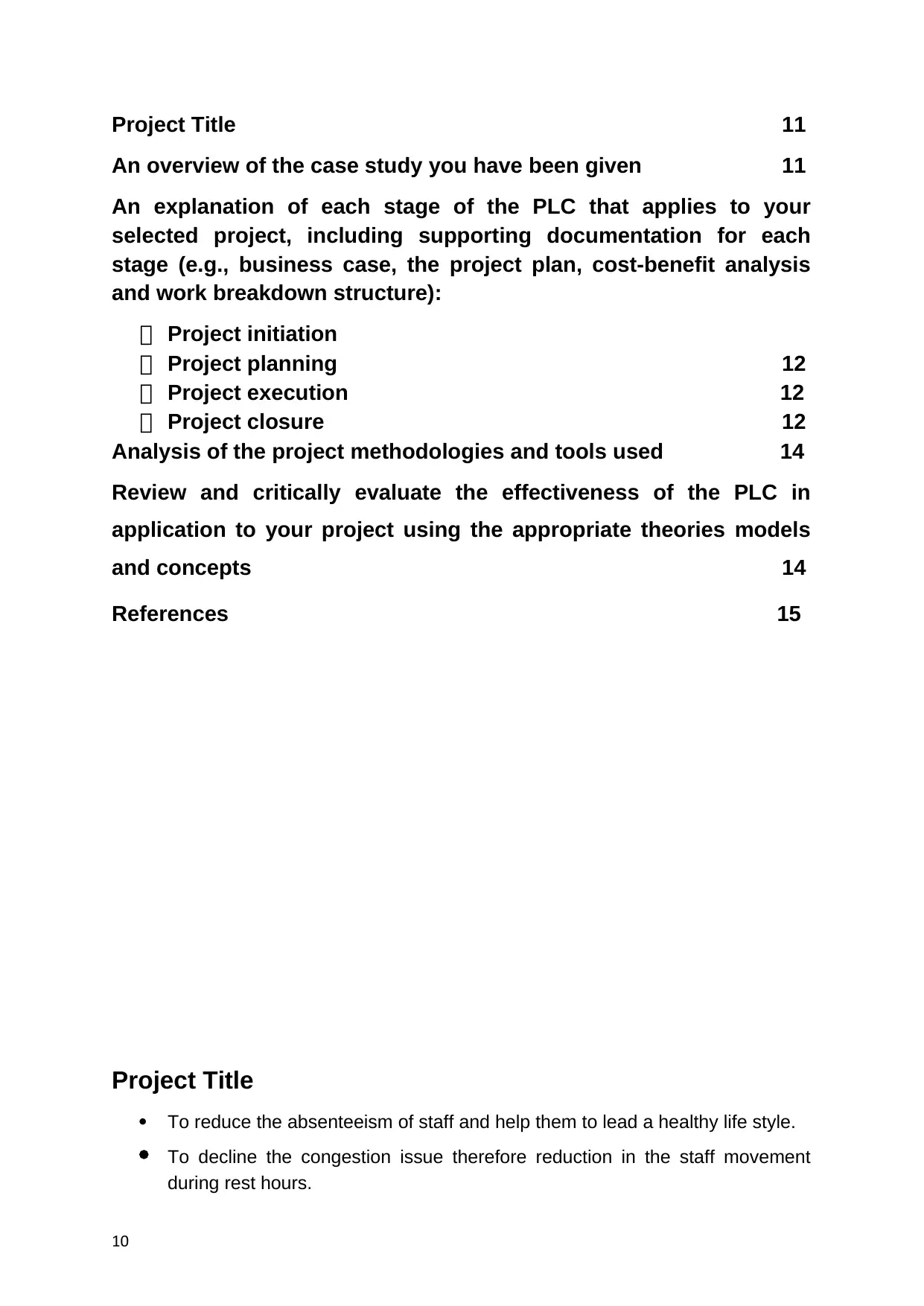
Project Title 11
An overview of the case study you have been given 11
An explanation of each stage of the PLC that applies to your
selected project, including supporting documentation for each
stage (e.g., business case, the project plan, cost-benefit analysis
and work breakdown structure):
Project initiation
Project planning 12
Project execution 12
Project closure 12
Analysis of the project methodologies and tools used 14
Review and critically evaluate the effectiveness of the PLC in
application to your project using the appropriate theories models
and concepts 14
References 15
Project Title
To reduce the absenteeism of staff and help them to lead a healthy life style.
To decline the congestion issue therefore reduction in the staff movement
during rest hours.
10
An overview of the case study you have been given 11
An explanation of each stage of the PLC that applies to your
selected project, including supporting documentation for each
stage (e.g., business case, the project plan, cost-benefit analysis
and work breakdown structure):
Project initiation
Project planning 12
Project execution 12
Project closure 12
Analysis of the project methodologies and tools used 14
Review and critically evaluate the effectiveness of the PLC in
application to your project using the appropriate theories models
and concepts 14
References 15
Project Title
To reduce the absenteeism of staff and help them to lead a healthy life style.
To decline the congestion issue therefore reduction in the staff movement
during rest hours.
10
Paraphrase This Document
Need a fresh take? Get an instant paraphrase of this document with our AI Paraphraser
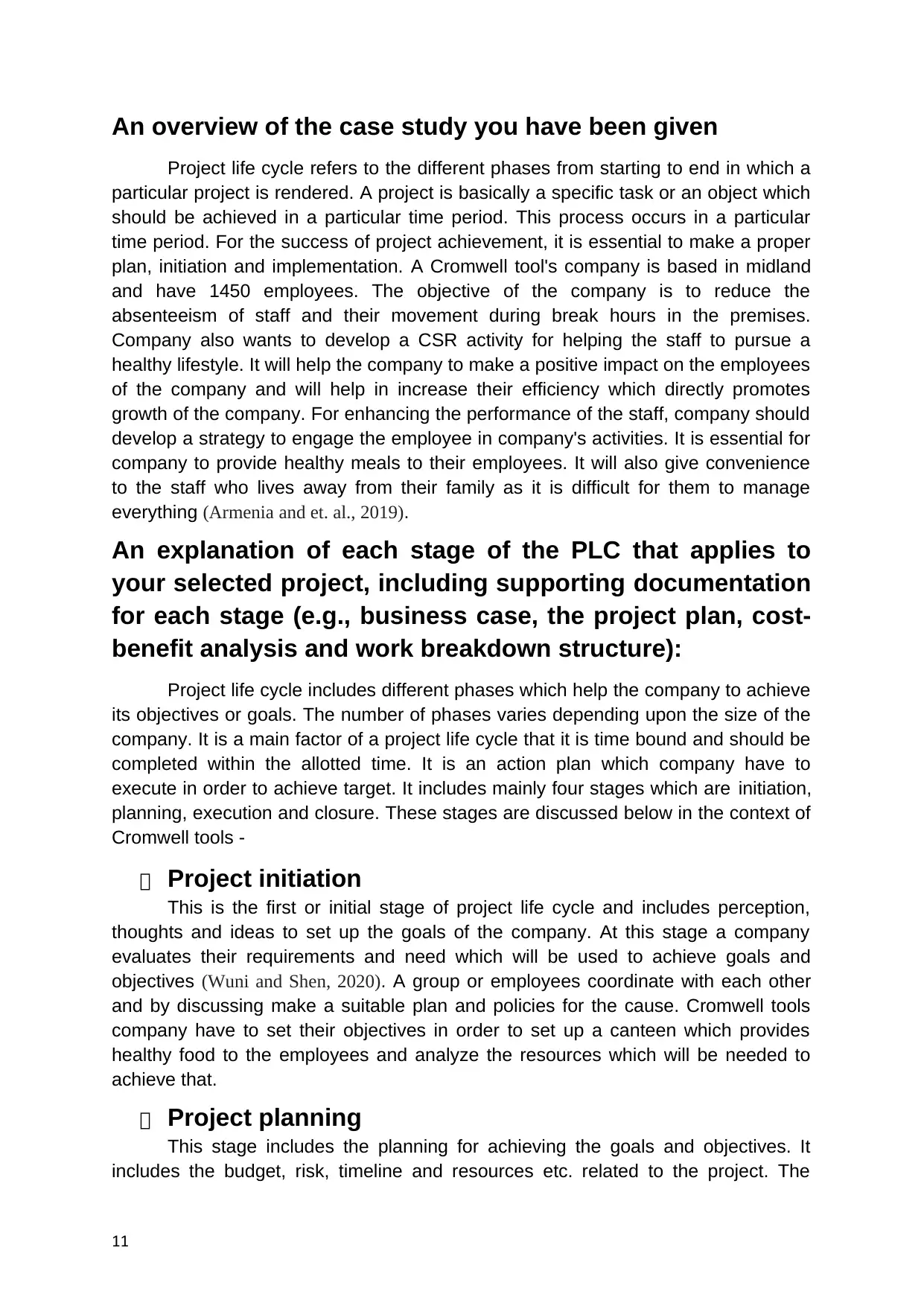
An overview of the case study you have been given
Project life cycle refers to the different phases from starting to end in which a
particular project is rendered. A project is basically a specific task or an object which
should be achieved in a particular time period. This process occurs in a particular
time period. For the success of project achievement, it is essential to make a proper
plan, initiation and implementation. A Cromwell tool's company is based in midland
and have 1450 employees. The objective of the company is to reduce the
absenteeism of staff and their movement during break hours in the premises.
Company also wants to develop a CSR activity for helping the staff to pursue a
healthy lifestyle. It will help the company to make a positive impact on the employees
of the company and will help in increase their efficiency which directly promotes
growth of the company. For enhancing the performance of the staff, company should
develop a strategy to engage the employee in company's activities. It is essential for
company to provide healthy meals to their employees. It will also give convenience
to the staff who lives away from their family as it is difficult for them to manage
everything (Armenia and et. al., 2019).
An explanation of each stage of the PLC that applies to
your selected project, including supporting documentation
for each stage (e.g., business case, the project plan, cost-
benefit analysis and work breakdown structure):
Project life cycle includes different phases which help the company to achieve
its objectives or goals. The number of phases varies depending upon the size of the
company. It is a main factor of a project life cycle that it is time bound and should be
completed within the allotted time. It is an action plan which company have to
execute in order to achieve target. It includes mainly four stages which are initiation,
planning, execution and closure. These stages are discussed below in the context of
Cromwell tools -
Project initiation
This is the first or initial stage of project life cycle and includes perception,
thoughts and ideas to set up the goals of the company. At this stage a company
evaluates their requirements and need which will be used to achieve goals and
objectives (Wuni and Shen, 2020). A group or employees coordinate with each other
and by discussing make a suitable plan and policies for the cause. Cromwell tools
company have to set their objectives in order to set up a canteen which provides
healthy food to the employees and analyze the resources which will be needed to
achieve that.
Project planning
This stage includes the planning for achieving the goals and objectives. It
includes the budget, risk, timeline and resources etc. related to the project. The
11
Project life cycle refers to the different phases from starting to end in which a
particular project is rendered. A project is basically a specific task or an object which
should be achieved in a particular time period. This process occurs in a particular
time period. For the success of project achievement, it is essential to make a proper
plan, initiation and implementation. A Cromwell tool's company is based in midland
and have 1450 employees. The objective of the company is to reduce the
absenteeism of staff and their movement during break hours in the premises.
Company also wants to develop a CSR activity for helping the staff to pursue a
healthy lifestyle. It will help the company to make a positive impact on the employees
of the company and will help in increase their efficiency which directly promotes
growth of the company. For enhancing the performance of the staff, company should
develop a strategy to engage the employee in company's activities. It is essential for
company to provide healthy meals to their employees. It will also give convenience
to the staff who lives away from their family as it is difficult for them to manage
everything (Armenia and et. al., 2019).
An explanation of each stage of the PLC that applies to
your selected project, including supporting documentation
for each stage (e.g., business case, the project plan, cost-
benefit analysis and work breakdown structure):
Project life cycle includes different phases which help the company to achieve
its objectives or goals. The number of phases varies depending upon the size of the
company. It is a main factor of a project life cycle that it is time bound and should be
completed within the allotted time. It is an action plan which company have to
execute in order to achieve target. It includes mainly four stages which are initiation,
planning, execution and closure. These stages are discussed below in the context of
Cromwell tools -
Project initiation
This is the first or initial stage of project life cycle and includes perception,
thoughts and ideas to set up the goals of the company. At this stage a company
evaluates their requirements and need which will be used to achieve goals and
objectives (Wuni and Shen, 2020). A group or employees coordinate with each other
and by discussing make a suitable plan and policies for the cause. Cromwell tools
company have to set their objectives in order to set up a canteen which provides
healthy food to the employees and analyze the resources which will be needed to
achieve that.
Project planning
This stage includes the planning for achieving the goals and objectives. It
includes the budget, risk, timeline and resources etc. related to the project. The
11
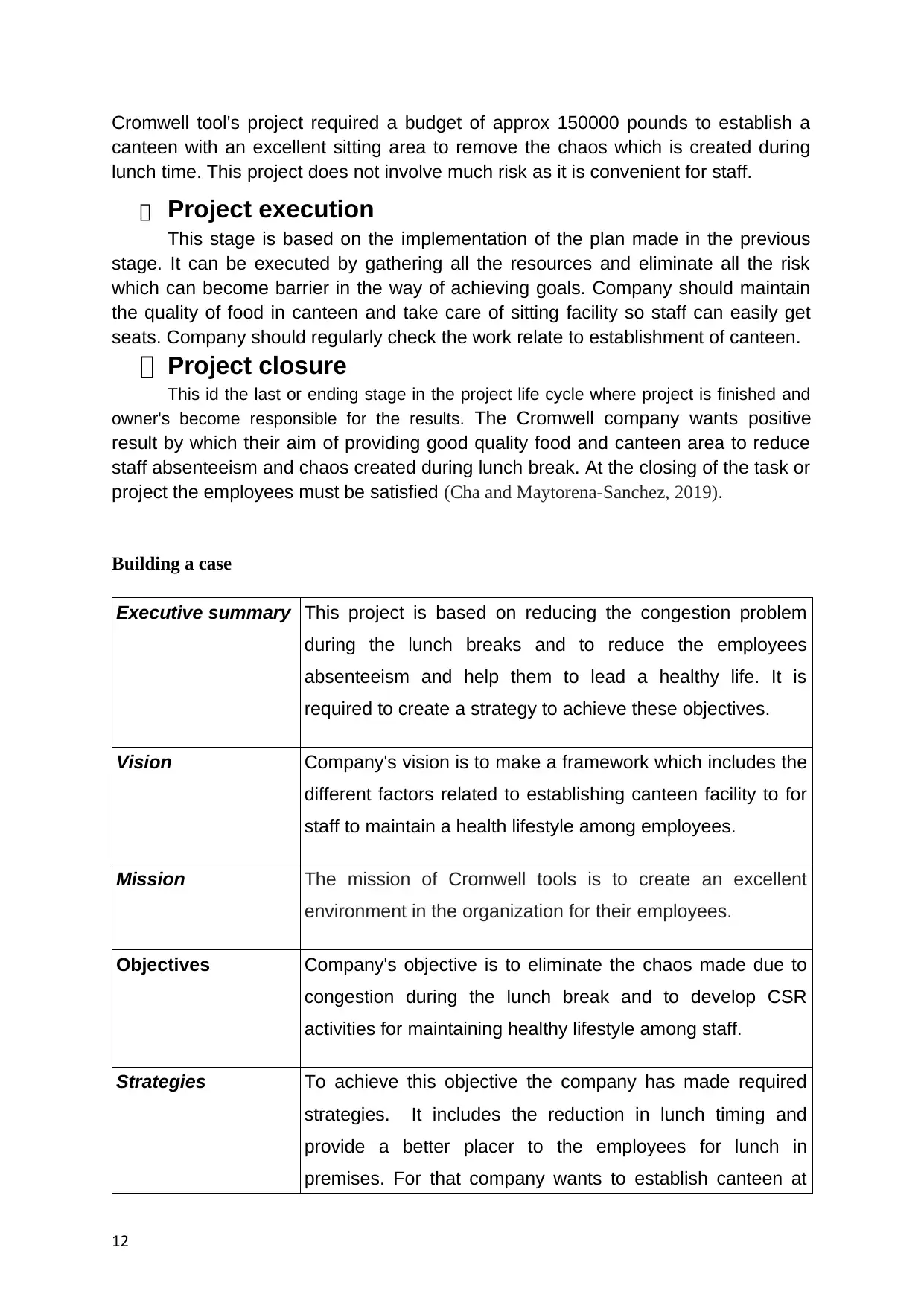
Cromwell tool's project required a budget of approx 150000 pounds to establish a
canteen with an excellent sitting area to remove the chaos which is created during
lunch time. This project does not involve much risk as it is convenient for staff.
Project execution
This stage is based on the implementation of the plan made in the previous
stage. It can be executed by gathering all the resources and eliminate all the risk
which can become barrier in the way of achieving goals. Company should maintain
the quality of food in canteen and take care of sitting facility so staff can easily get
seats. Company should regularly check the work relate to establishment of canteen.
Project closure
This id the last or ending stage in the project life cycle where project is finished and
owner's become responsible for the results. The Cromwell company wants positive
result by which their aim of providing good quality food and canteen area to reduce
staff absenteeism and chaos created during lunch break. At the closing of the task or
project the employees must be satisfied (Cha and Maytorena-Sanchez, 2019).
Building a case
Executive summary This project is based on reducing the congestion problem
during the lunch breaks and to reduce the employees
absenteeism and help them to lead a healthy life. It is
required to create a strategy to achieve these objectives.
Vision Company's vision is to make a framework which includes the
different factors related to establishing canteen facility to for
staff to maintain a health lifestyle among employees.
Mission The mission of Cromwell tools is to create an excellent
environment in the organization for their employees.
Objectives Company's objective is to eliminate the chaos made due to
congestion during the lunch break and to develop CSR
activities for maintaining healthy lifestyle among staff.
Strategies To achieve this objective the company has made required
strategies. It includes the reduction in lunch timing and
provide a better placer to the employees for lunch in
premises. For that company wants to establish canteen at
12
canteen with an excellent sitting area to remove the chaos which is created during
lunch time. This project does not involve much risk as it is convenient for staff.
Project execution
This stage is based on the implementation of the plan made in the previous
stage. It can be executed by gathering all the resources and eliminate all the risk
which can become barrier in the way of achieving goals. Company should maintain
the quality of food in canteen and take care of sitting facility so staff can easily get
seats. Company should regularly check the work relate to establishment of canteen.
Project closure
This id the last or ending stage in the project life cycle where project is finished and
owner's become responsible for the results. The Cromwell company wants positive
result by which their aim of providing good quality food and canteen area to reduce
staff absenteeism and chaos created during lunch break. At the closing of the task or
project the employees must be satisfied (Cha and Maytorena-Sanchez, 2019).
Building a case
Executive summary This project is based on reducing the congestion problem
during the lunch breaks and to reduce the employees
absenteeism and help them to lead a healthy life. It is
required to create a strategy to achieve these objectives.
Vision Company's vision is to make a framework which includes the
different factors related to establishing canteen facility to for
staff to maintain a health lifestyle among employees.
Mission The mission of Cromwell tools is to create an excellent
environment in the organization for their employees.
Objectives Company's objective is to eliminate the chaos made due to
congestion during the lunch break and to develop CSR
activities for maintaining healthy lifestyle among staff.
Strategies To achieve this objective the company has made required
strategies. It includes the reduction in lunch timing and
provide a better placer to the employees for lunch in
premises. For that company wants to establish canteen at
12
⊘ This is a preview!⊘
Do you want full access?
Subscribe today to unlock all pages.

Trusted by 1+ million students worldwide
1 out of 15
Related Documents
Your All-in-One AI-Powered Toolkit for Academic Success.
+13062052269
info@desklib.com
Available 24*7 on WhatsApp / Email
![[object Object]](/_next/static/media/star-bottom.7253800d.svg)
Unlock your academic potential
Copyright © 2020–2026 A2Z Services. All Rights Reserved. Developed and managed by ZUCOL.

